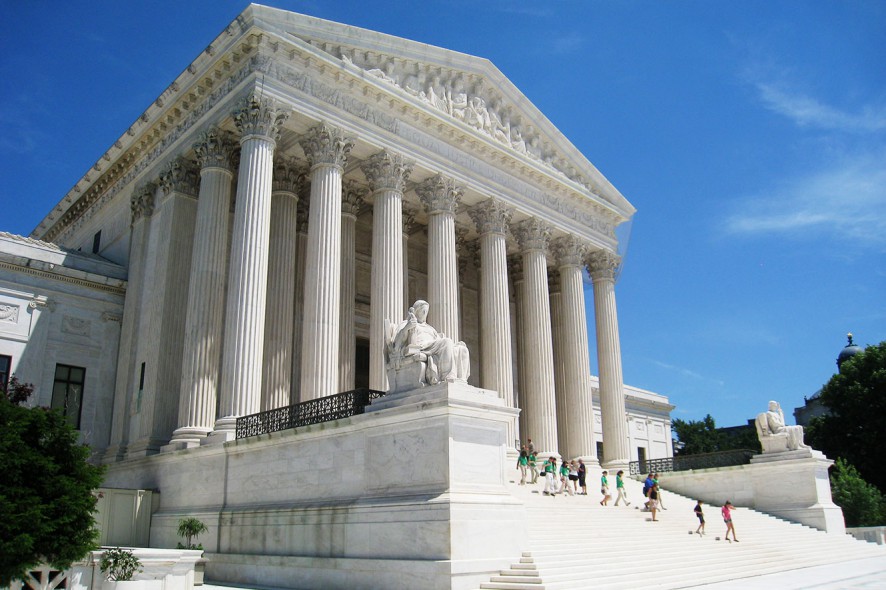Supreme Court of The United States: While deciding upon the instant emergency application brought in by the Alabama Association of Realtors challenging the nationwide moratorium on evictions of any tenants during the Covid-19 pandemic; the Court with a ratio of 6:3, decided to end the federal moratorium on residential evictions citing that the Centers for Disease Control and Prevention (hereinafter CDC) clearly exceeded its authority under the Coronavirus Aid, Relief, and Economic Security Act, 2020 by taking the matters into its own hands and subsequent extension of the March 2020 moratorium through July 2021.
Background: In March 2020, Congress passed the Coronavirus Aid, Relief, and Economic Security Act to ease the burdens caused by the rapidly increasing COVID–19 pandemic. Among other reliefs, the Act imposed a 120-day eviction moratorium for properties that participated in federal assistance programs or were subject to federally backed loans. When the eviction moratorium expired in July, Congress did not renew it. However, the CDC upon concluding that further action was needed “did what the Congress did not” and renewed the moratorium, covering all residential properties nationwide and imposing criminal penalties on violators.
The CDC’s moratorium was originally slated to expire on December 31, 2020, but Congress extended it for one month as part of the second Covid–19 relief Act. As the new deadline approached, the CDC again took matters into its own hands and extended its moratorium through March, then again through June, and ultimately through July 2021.
Contentions: The CDC contended that S. 361(a) of the Public Health Service Act allows it to ‘make and enforce such regulations (as in his judgment) which are necessary to prevent the introduction, transmission, or spread of communicable diseases from foreign countries into the States or possessions, or from one State or possession into any other State or possession’. Thus the provision gives the CDC broad authority to take whatever measures it deems necessary to control the spread of COVID–19, including issuing the moratorium.
The Realtor associations and rental property managers in Alabama and Georgia meanwhile argued that the moratorium has put the landlords across the country at risk of irreparable harm by depriving them of rent payments with no guarantee of eventual recovery. Despite the CDC’s determination that landlords should bear a significant financial cost of the pandemic, many landlords have modest means, and preventing them from evicting tenants who breach their leases intrudes on one of the most fundamental elements of property ownership—the right to exclude. It was also contended that the CDC has exceeded it statutory authority in renewing and extending the eviction moratorium.
Observations: The Majority comprising of John Roberts, C.J., Amy Coney Barrett, Brett Kavanaugh (concurring), Samuel Alito, Neil Gorsuch and Clarence Thomas, JJ., noted that it is indisputable that the public has a strong interest in combating the spread of the COVID–19 Delta variant, but “our system does not permit agencies to act unlawfully even in pursuit of desirable ends”. The Judges observed that the moratorium’s constant extension meant that the equities have begun to favour the landlords and their contentions became stronger because vaccine and rental-assistance distribution had improved since the stay was entered, while the harm to landlords had continued to increase. Perusing the aforementioned arguments of the CDC, the Court noted that the downstream connection between eviction and the interstate spread of disease is noticeably different from the direct targeting of disease that characterizes the measures identified in the statute. “Reading both sentences together, rather than the first in isolation, it is a stretch to maintain that S. 361(a) gives the CDC the authority to impose this eviction moratorium”.
Coming down heavily upon the CDC and the Government, the Court also observed that the issues at stake are not merely financial. The moratorium intrudes into an area that is the particular domain of state law: the landlord-tenant relationship- “This claim of expansive authority under S. 361(a) is unprecedented. Since that provision’s enactment in 1944, no regulation premised on it has even begun to approach the size or scope of the eviction moratorium. And it is further amplified by the CDC’s decision to impose criminal penalties of up to a $250,000 fine and one year in jail on those who violate the moratorium. Section 361(a) is a wafer-thin reed on which to rest such sweeping power”.
The Majority concluded by holding that even if the Government believed that its action was necessary to avert a national catastrophe, the same could not overcome a lack of Congressional authorization. It is up to Congress, not the CDC, to decide whether the public interest merits further action here. “If a federally imposed eviction moratorium is to continue, Congress must specifically authorize it”.
Dissenting Opinion: Stephen Breyer, Sonia Sotomayor and Elena Kagan, JJ., disagreed with the observations of the majority and observed that the Court should not set aside the CDC’s eviction moratorium in this summary proceeding as the criteria for granting the emergency application have not been met in the instant matter. It was further observed that, “Applicants raise contested legal questions about an important federal statute on which the lower courts are split and on which this Court has never actually spoken. These questions call for considered decision making, informed by full briefing and argument”.
[Alabama Association for Realtors v. Dept. of Health and Human Services, 2021 SCC OnLine US SC 14, decided on 26-08-2021]
Sucheta Sarkar, Editorial Assistant has reported this brief.






